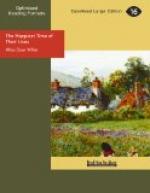“O Pete!” she said again, but this time with a sort of sad resignation. Then shaking her head as if to say that she wasn’t, after all, as narrow as he thought, she hitched her chair nearer the table and said eagerly, “Well, tell me all about it.”
Wayne looked down at his mother as she sat opposite him, with her elbows on the table, as keen as a child and as lively as a cricket. He asked himself if he had not drifted into a needlessly sentimental state of mind about her. He even asked himself, as he had done once or twice before in his life, whether her love for him implied the slightest dependence upon his society. Wasn’t it perfectly possible that his going would free her life, would make it easier instead of harder? Every man, he knew, felt the element of freedom beneath the despair of breaking even the tenderest of ties. Some women, he supposed, might feel the same way about their love-affairs. But could they feel the same about their maternal relations? Could it be that his mother, that pure, heroic, self-sacrificing soul, was now thinking more about her liberty than her loss? Had not their relation always been peculiarly free? he found himself thinking reproachfully. Once, he remembered, when he had been working unusually hard he had welcomed her absence at one of her conferences on inebriety. Never before had he imagined that she could feel anything but regret at his absences. “Everybody is just alike,” he found himself rather bitterly thinking.
“What do you want to know about it?” he said aloud.
“Why, everything,” she returned.
“I met her,” he said, “two evenings ago at a dance. I never expected to fall in love at a dance.”
“Isn’t it funny? No one ever really expects to fall in love at all, and everybody does.”
He glanced at her. He had been prepared to explain to her about love; and now it occurred to him for the first time that she knew all about it. He decided to ask her the great question which had been occupying his mind as a lover of a scientific habit of thought.
“Mother,” he said, “how much dependence is to be placed on love—one’s own, I mean?”
“Goodness, Pete! What a question to ask!”
“Well, you might take a chance and tell me what you think. I have no doubts. My whole nature goes out to this girl; but I can’t help knowing that if we go on feeling like this till we die, we shall be the exception. Love’s a miracle. How much can one trust to it?”
The moment he had spoken he knew that he was asking a great deal. It was torture to his mother to express an opinion on an abstract question. She did not lack decision of conduct. She could resolve in an instant to send a drunkard to an institution or take a trip round the world; but on a matter of philosophy of life it was as difficult to get her to commit herself as if she had been upon the witness-stand. Yet it was just in this realm that he particularly valued her opinion.




